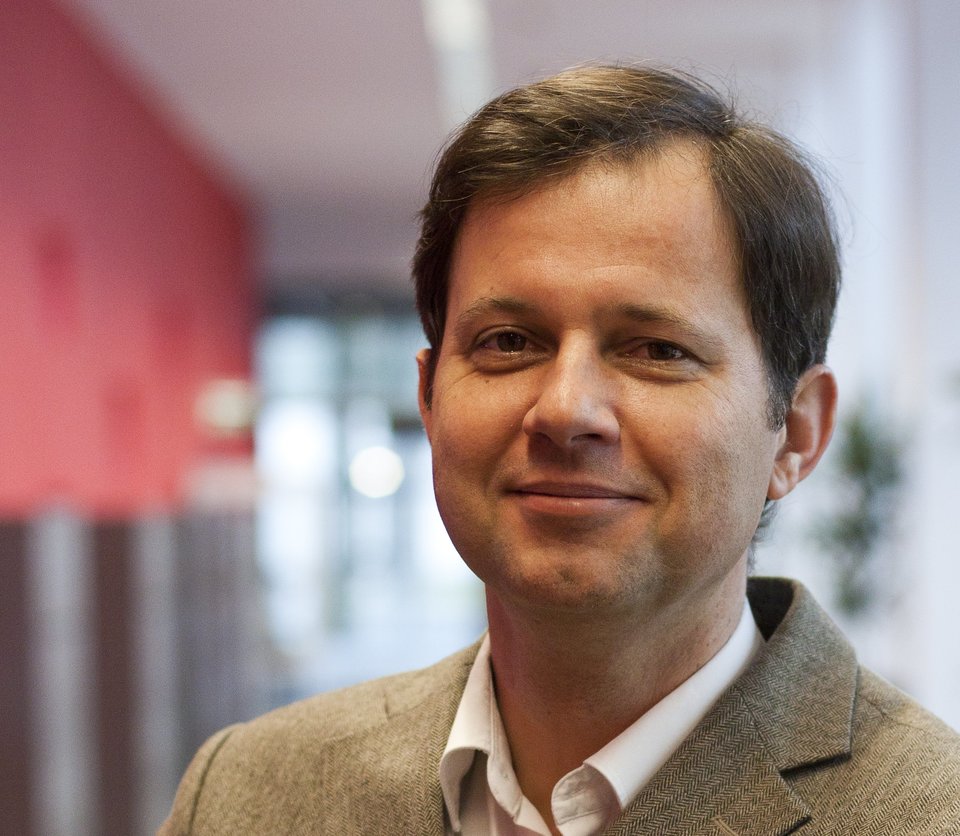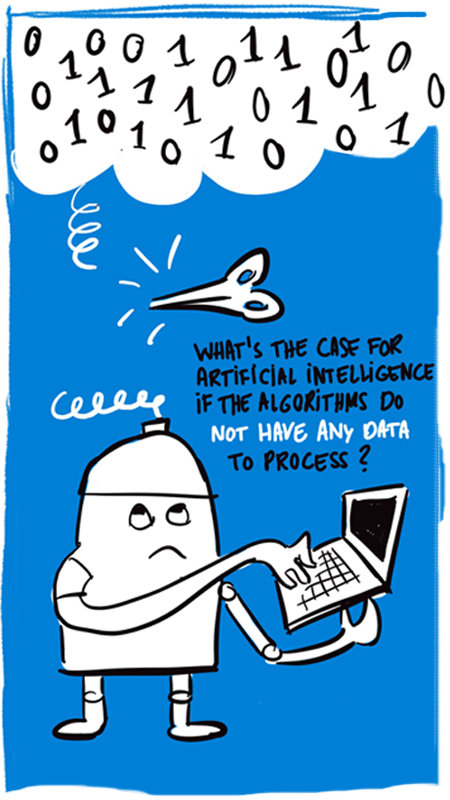
'Digital is the new foundation of our society'
Interview with Gerard de Graaf, Director for the Digital Single Market at the European Commission
By: Jurjen Slump
The European Union is an important driver of innovation. Both TomTom and Skype originated from EU research and development programmes. Brussels is therefore of great importance for scientists, as well as for start-ups and SMEs. What is the EU’s underlying vision on innovation and how does the European Commission regard the Netherlands and TU Delft in this respect? Someone who knows all about this is the Dutchman Gerard de Graaf, Director for the Digital Single Market at DG CONNECT.
The example comes up a few times during the interview to illustrate the importance of a single internal digital market, because that’s where it all starts. “Paradoxically enough, today it’s easier to send a box across the border than it is to transmit bits and bytes for providing digital services throughout Europe,” says De Graaf. And this in a time when a society without digital services is unimaginable. “In the past, ‘digital’ was an industry. Today it’s the foundation of our entire society.”
Free flow of data
“The economy is all about data,” he continues. “All of us are occupied with artificial intelligence, high-performance computing, the cloud and 5G.” A precondition, however, is a “free flow of data” throughout the EU. “What’s the use of high-performance computing if the data to be run through those computers are missing? And what’s the use of artificial intelligence if the algorithms do not have any data to process?"
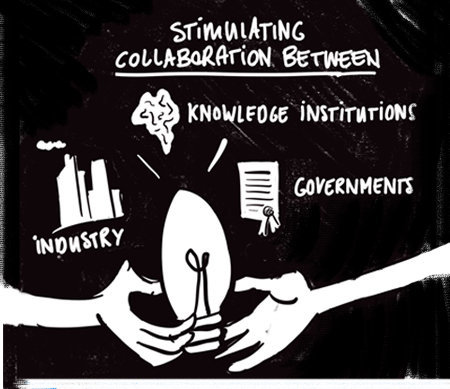
In the past, ‘digital’ was an industry. Today it’s the foundation of our entire society.
Gerard de Graaf, Director for the Digital Single Market at the European Commission
According to De Graaf, data are “absolutely essential", and this “free flow” of data is a prerequisite for investing in these new technologies. All the more so because Europe does not have large platforms such as Google, Amazon or Facebook giving access to enormous amounts of data.
Removing obstacles
Creating the right preconditions and removing obstacles: that’s how De Graaf summarises the core of the European Commission’s policy on innovation. “Only then will we have a large, single market. If the EU remains fragmented, we will not get the advantages enjoyed by the Americans and the Chinese and we will not be able to achieve our goals.”
De Graaf emphasises that, in order to remove the obstacles, it is important to pay due attention to technological developments. “Technology and policy must go hand-in-hand, because technology works within a broader context.” A context that also involves related issues such as the protection of personal data, cybersecurity and intellectual property.
Start-up Europe
Removing obstacles, free flow of data, a single internal market: these are all abstract things. What does this policy actually mean for start-ups, SMEs and researchers in practice? How do you bring the 27 Member States, with all their differences, in line with one another?
The answer is: customised solutions. Linking up with existing, successful initiatives and trying to strengthen these further. “Of course, a lot of this is already in place. It’s not that we want to set up new structures. There are ongoing initiatives in many countries, such the RoboValley in Delft, which are doing exactly what we have in mind. They should definitely continue with what they are doing,” says De Graaf. “If we can strengthen these initiatives from within the EU, then that’s what we should do.”
For example, we have the Startup Europe programme initiated by former European Commissioner Neelie Kroes, specifically for start-ups. The aim of this programme is to connect the various pockets of excellence within Europe - one of which is Delft - with one another. As a result, start-ups can scale up faster and come into contact with investors, accelerators and knowledge institutions via the Startup Europe network.
It should be easier for small businesses to apply for funding under Horizon 2020
Gerard de Graaf, Director for the Digital Single Market at the European Commission
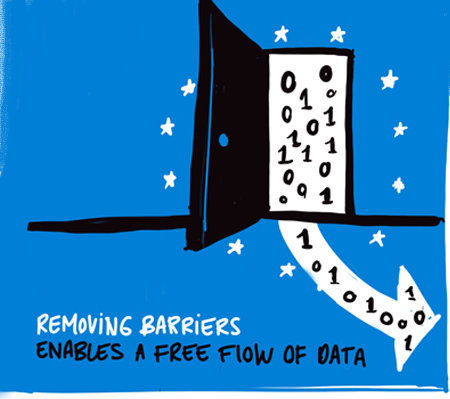
Digital Innovation Hubs
For small and medium-sized businesses that want to make use of new technological innovations, so-called Digital Innovation Hubs have been set up. These are ‘local ecosystems’ comprised of large and small companies, start-ups, incubators and investors, centred around a large research institution or university. The aim is to help companies, and particularly SMEs, to deploy new technology.
“One of the big challenges is how we can make our industry even more competitive with the help of digital innovations,” explains De Graaf. Large companies, such as those in the automotive industry, are already doing this, but it is more difficult for small and medium-sized companies to translate new technology into new business models or production processes. “This is where we feel that the Digital Innovation Hubs can play an important role.”
Companies can approach these hubs for getting advice from scientists, while other companies could be brought up to speed on, for example, artificial intelligence or big data. They will receive assistance in developing a new business model and testing and implementing the necessary technology. In the field of robotics, the smart-industry field lab RoboHouse will be opened in Delft this year for this very purpose.
Living labs
Here too, the keyword is customisation. “‘Digital Innovation Hub’ is a bit of a catch-all term.” Many existing knowledge clusters do the same work, without actually being labelled as such. “But naturally we’re not going to tell the Member States: this is how we want you to do it. No. If it’s working well: no need to change a winning formula.”
The Netherlands leads the way in this respect. “There’s still a lot we can learn from the approach adopted by certain Member States,” says De Graaf. “For example, what’s happening in Delft is extremely interesting: YESDelft is a fantastic initiative!” According to him, living labs can also add value. “Absolutely. That’s exactly the sort of ecosystem you need. Where each organism plays its role, thereby enhancing the whole.”
Yet, at the same time, this is part of the problem: not every Member State has reached the same level in the area of digital innovation. “There is not enough oxygen in the ecosystem to go around. Certain organisms are missing.” That is why the EU wants to connect several Digital Innovation Hubs with one another. “Some Member States, including the Netherlands, are world leaders. If we succeed in propagating these best practices and thus encourage the stronger States to lift up the weaker ones, we will all benefit in the end,” predicts De Graaf. “It is a race we all win.”
TU Delft
By now, the answer to our earlier question is clear: De Graaf in Brussels holds the Netherlands and TU Delft in high regard. “In the digital area, the Netherlands is a pioneer in Europe.” The country regularly tops the list when it comes to connectivity, i.e. the availability and use of the internet. But the Netherlands is also a strong player from a technological and innovative perspective.
Within the Netherlands, TU Delft is a “very important partner” of the European Commission. “Because TU Delft leads the way in a number of areas: robotics, quantum computing and blockchain technology. And I’m not saying that just because I’m Dutch or because I come from Delft, but because the Netherlands, and TU Delft in particular, rank among the very best in Europe.”
What’s the use of artificial intelligence if the algorithms do not have any data to process?
Gerard de Graaf, Director for the Digital Single Market at the European Commission
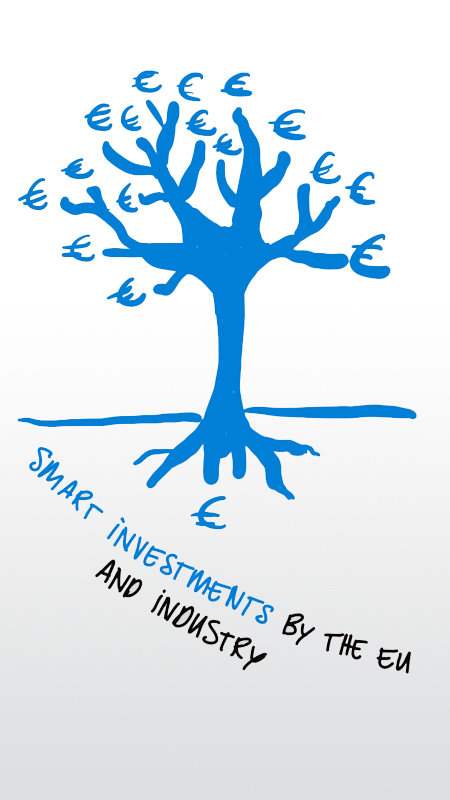
QuTech
De Graaf expects TU Delft to continue playing an important role in a number of projects which are still in the pipeline, such as those in the area of quantum computing. “We plan to launch a European flagship project of about one billion Euros in the area of quantum computing, and TU Delft has a great deal of expertise in this area.” With this, he is referring to QuTech, the institute for quantum computing where TU Delft and TNO work in collaboration with chip manufacturer Intel and other parties.
“Some of the real authorities in the area of quantum computing can be found at TU Delft. Together with other universities in Europe, research institutes and companies, they will have to take the lead in this initiative.”
He is also full of praise for Delft’s contribution in other areas. “Whether we are talking about robotics, blockchain or related areas: TU Delft has an excellent reputation.”
SME Instrument
Back to Brussels. The Horizon 2020 programme is very important for the research activities of many scientists and companies that are seeking funding for innovative projects. However, an often-heard complaint is that the application process would be too complex for SMEs. De Graaf admits that it should be easier for small businesses to apply for funding under Horizon 2020. That is why a separate counter for entrepreneurs, known as the ‘SME Instrument’, has been set up. Proposals submitted should not exceed 10 pages and once selected, the funds will be transferred within three months.
The selection procedure remains strict: 8 or 9 out of 10 proposals are rejected. “That’s not so much because the process is bureaucratic, but because the competition is very strong.” This strict selection procedure may also lead to a certain amount of frustration, De Graaf suspects. But these procedures are necessary. “After all, we are an organisation that must be able to justify its handling of public funds.”
If we do not join forces, we will be blown away by the Americans and the Chinese
Gerard de Graaf, Director for the Digital Single Market at the European Commission
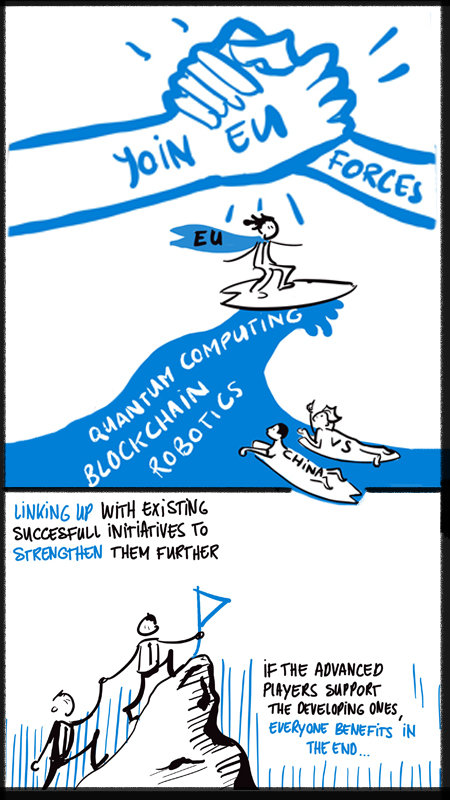
Transparency
At the same time, De Graaf feels that there is room for improvement. He is surprised that an investment programme as large as Horizon 2020 - with funds totalling more than 70 billion Euros over a period of seven years - should have attracted so little attention from venture capitalists, investors, business angels and incubators. “You would expect them to be hovering around the programme, on the look-out for attractive companies.” And justifiably so: after all, TomTom originated from the framework programme (the forerunner of Horizon 2020), just as Skype and ARM.
From this spring onwards, more information about companies and innovations receiving European funds will be made publicly available by the European Commission via the Innovation Radar Platform. This will also include information on the distance-to-market, the need for investors and assistance in the area of strategy. “Everyone will be able to search quickly for information by theme, country or technology in areas such as robotics, quantum computing or biotechnology.” Clear information about everything going on in Europe will be just a click away: expected breakthroughs, the people behind them, the required capital, etc.
De Graaf hopes that this will help create an ‘ecosystem’ around the European research and innovation programme. That’s what Europe needs. “We excel in science, but our go-to-market capabilities are insufficient.” More clarity about what the EU wants to invest in would help in this respect. “That is also a way to valorise knowledge.”
Smart investments
But, in the end, money alone is not enough. Europe can only remain competitive in the global market by working - at a European level - on issues such as data protection, privacy, cybersecurity and the single digital market. “If we can bring together the best of Europe, we stand a good chance,” says De Graaf. “We need to do this by being smarter. It’s not just about investing, but investing smartly.”
De Graaf has been working for the European Commission for 27 years now, which he calls a “fantastic organisation”. “Of course there is a lot of criticism about Europe, and that is partly justified,” he acknowledges. But one must not overlook the “many important things” done by the EU, especially in the area of new technology. “The scale is such that it’s no longer feasible to do this at a Member State level. If we do not join forces, we will be blown away by the Americans and the Chinese.”
Innovation & Impact Centre and the EU
Top 10
"TU Delft ranks in the top 10 of EU-funded R&D projects in higher education in Europe. A large part of this involves the ERC grants for excellent research. Each year, we receive between 50 and 60 million Euros from Brussels. The majority of these funds (42 million) come from Horizon 2020, while the remainder is supplied by other funds such as regional development funds, as well as via the KICs (Knowledge and Innovation Communities) in the field of Climate, Health and Raw Materials."
Discussion partner
“TU Delft is much more than just a recipient of research funds. We actively engage in a dialogue with European politicians and policymakers about how TU Delft can make an impact on creating a better society. That means we listen to the EU and the EU listens to us. This exchange takes place on equal terms. We are truly partners. For example: many researchers in Delft also serve as experts on EU advisory committees. There is ongoing interaction.”
Innovation & Impact Centre
“At the TU Delft Innovation & Impact Centre, we have a team that helps researchers apply for funding for various projects, including the ERC grants. There are six grant advisers who guide researchers through the entire application process. We also have a team of project managers who coordinate the large-scale EU projects. Currently, there are about 30 such projects.”
Diversity
“The research projects financed with European funds ensure a rich diversity within the researcher and student community. We work together with universities and partners from all over Europe and many research talents find their way to Delft. Collaboration is not only required, but it also makes sense because it delivers true added value for the scientific research. Researchers from different countries will look at things differently.”
